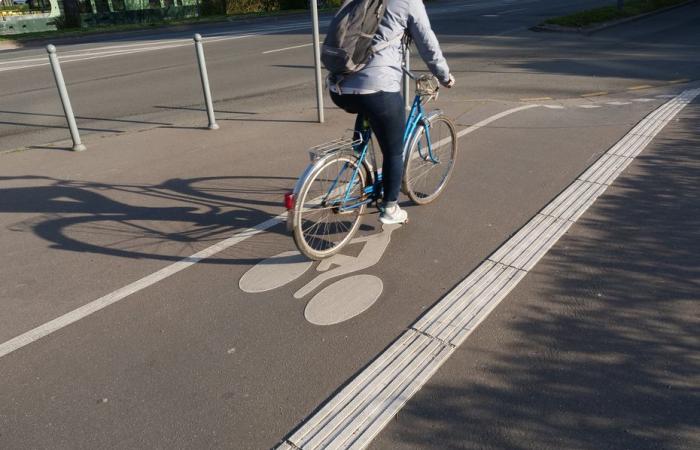
While demonstrations flourished in France this Saturday, October 19, 2024 in tribute to Paul Varry, a cyclist who died crushed by a car after a dispute, the question of the safety of bicycle users arises. The Cycling Rights Association (ADAV) takes stock of the situation in Lille, often criticized for its lack of facilities.
Company
From daily life to major issues, discover the subjects that make up local society, such as justice, education, health and family.
France Télévisions uses your email address to send you the “Society” newsletter. You can unsubscribe at any time via the link at the bottom of this newsletter. Our privacy policy
Bicycle bells ring in front of Lille town hall. More than 300 people, cyclists or residents shocked by the news, gathered on October 19, 2024 to pay tribute to Paul Varry. Rallies were planned throughout France this weekend, to support the loved ones of the 27-year-old young man who died on a bicycle, run over by a motorist with whom he had just had a dispute. A terrible scene which took place on October 15, in the 8th arrondissement of Paris.
A minute of silence rang out, and conversations resumed between demonstrators. “We often have the impression as a cyclist that we are a living attack on motorists.“, relates Pierre, a Spanish teacher. A feeling unfortunately shared by many cycling enthusiasts in the metropolis of Lille (MEL), where the facilities have long been criticized for the lack of safety they offer cyclists.
We asked three questions to Cécile Guillaume, administrator responsible for inclusion at the ADAV (Association for the Right to Cycling) in Lille, to understand the insecurity that can weigh on cyclists in the capital of Flanders.
Cécile Guillaume : “The arrival of V’Lille in 2012 had already caused a boom and then, in 2016, with the change in Lille’s traffic plan and the one-way design of certain streets, bicycle traffic increased by 40%. But Covid precipitated everything. In France we are quite pragmatic: we are waiting for studies, we want to be sure that no one will be unhappy… The changes were already prepared and the pandemic abruptly changed everything with ephemeral adjustments which ultimately lasted.
I feel safer than before. (…) The arrangements help but awareness must be raised.
Cécile Guillaume, ADAV administrator
Two days ago, we had training on city calming with cyclists from everywhere (Compiègne, Beauvais, Brussels, Essonne…) who were able to visit the metropolis and its facilities. Well, they had stars in their eyes! They thought we were lucky to have these arrangements. When we are inside, we especially see what is wrong, but we must admit that the City has a strong desire to promote bicycle travel and to include us, which is not necessarily the case elsewhere. Around Lille, in Weppes in particular, there is an effort being made to create qualitative and visible developments: red cycle paths, bike locks with increased width… We feel that this is a real priority and I am aware that ‘as an elected official it can’t be easy to touch on the subject of cars.“
► Also read: MAINTENANCE. “Let us dare to touch the place of the car”, Yannick Paillard, fervent defender of cycling in Nord Pas-de-Calais
C.G. : “I feel safer than before, great efforts have been made recently and it is very appreciable, traffic is more comfortable. Despite everything, the feeling of insecurity persists: there are still no arrangements everywhere and, with the tragedy that took place in Paris, we can clearly see that they are not doing everything, that they are not enough . The young man was on one of these developments at the time of the incident.
What is needed above all is an awareness of others, of the fact that we must share space and be attentive to everyone. The arrangements help but awareness must be raised.“
Hundreds of cyclists gathered in front of Lille town hall this Saturday, October 19, 2024.
•
© Sebastien Gurak / FTV
► Also read: The number of cyclists fell by 6.6% in the metropolis of Lille in 2023
C.G. : “I can speak from my personal experience: I live in Wattignies, 5km from Lille, where there are fewer facilities and fewer cyclists. As a result, I get honked at or insulted by motorists a lot more because I’m not going fast enough. I am told to go and ride on a track when there isn’t one there. I also don’t want to say that relationships are always conflictual, it’s not my daily life, but they are significant events.
I find this opposition between pedestrian/cyclist or motorist/cyclist unfortunate. (…) We also want to move efficiently and quickly, we are not here to annoy everyone.
I find this opposition between pedestrian/cyclist or motorist/cyclist unfortunate. Traffic is always heavier in the metropolis and people are exhausted so the slightest annoyance creates tension with the bikes, they can no longer stand being slowed down. We also want to move efficiently and quickly, we are not here to annoy everyone.
This polarization is a kind of somewhat reductive categorization where the other is held responsible for all the difficulties we may encounter. We have difficulty agreeing. They want to move forward, I feel vulnerable, fragile and I often have the impression of being little considered in public space. Fortunately, not all motorists should be put in the same basket.“





